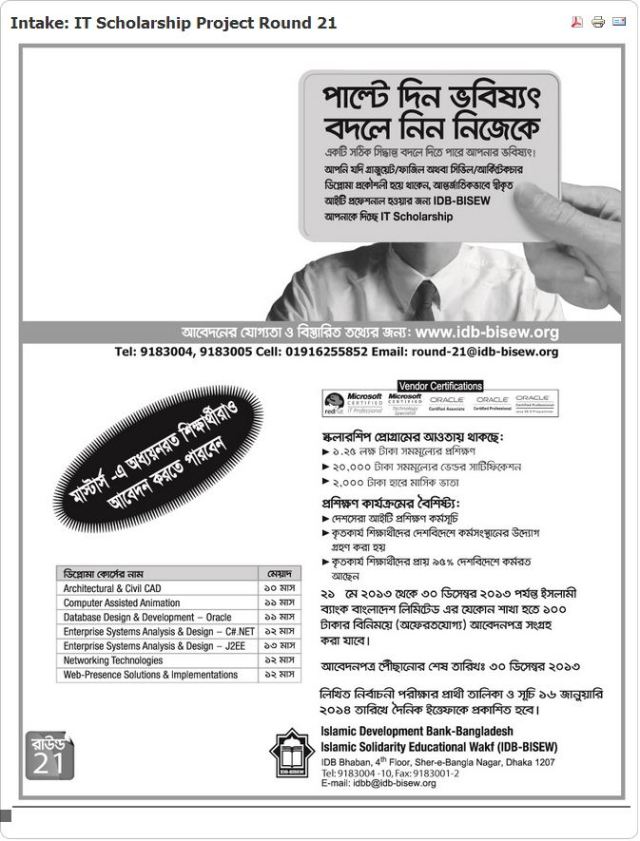| Answers to some commonly asked questions are given below: | ||||||||||||||||||||||||||||||||
Islamic Development Bank-Bangladesh Islamic Solidarity Educational Wakf (IDB-BISEW) was established following an agreement between the Islamic Development Bank, Jeddah, Saudi Arabia, and the Government of Bangladesh. IDB-BISEW undertakes funding and implementing of projects in the areas of education, human resource development and institutional strengthening. |
||||||||||||||||||||||||||||||||
It is a technology skills development project under which the scholarship winners are provided with a year-long training on an IT discipline leading to a professional diploma. Currently, around 800 trainees are undergoing training in Round – 14, 15, 16 and 17. Around 2,900 graduates of the past Rounds of the scholarship programme are employed as IT professionals in various organizations at home and abroad. |
||||||||||||||||||||||||||||||||
The selected candidates will get an opportunity to undergo training by participating in a Certificate or a Diploma level course at one of the premiere training institute in Dhaka & Chittagong. In financial terms these courses are worth approximately Tk. 1, 25,000 for training only. An additional sum of around Tk. 20,000 is spent for vendor certification for each trainee. Trainees also receive Tk. 2,000 per month as allowance. |
||||||||||||||||||||||||||||||||
The scholarship would cover the entire tuition fees for each courses offered. It also covers Vendor Certification examination fee that a candidate needs to pass in order to successfully complete the course. The scholarship would not cover the cost to be incurred by the candidate for food and accommodation during the training. |
||||||||||||||||||||||||||||||||
The student intake would take place between 3 to 4 times in a project year. Candidates may apply in multiple intakes if unsuccessful in earlier attempts. |
||||||||||||||||||||||||||||||||
A person who has already passed Bachelor’s (Pass Course/Honours) or Master’s degree examination can apply for the scholarship. Individuals holding Diploma in Civil Engineering, Architecture, Construction and Survey can also apply. |
||||||||||||||||||||||||||||||||
No, candidates not having any prior knowledge of computing are eligible to apply for the scholarship. |
||||||||||||||||||||||||||||||||
Following are the steps involved in the candidate selection process under IDB-BISEW scholarship program:
Buy the application kit from any of the designated branches of Islami Bank Bangladesh Ltd., which contains following:
Carefully go through the forms and the instructions for filling up the forms. Fill up each form. While doing that, the candidate should use a 2B pencil or black ball-point pen. Do not forget to tear off the section marked “Admit Card” at the bottom of the APPLICATION FORM. If selected, this section would be used as Admit Card at the time of selection exam. Without this Admit Card, a candidate even if selected, would not be allowed to take part in the selection exam. Put all properly filled up forms in the envelope provided. Do not use any other envelope. Mail, courier or hand-deliver the envelope to the specified address within the deadline of submitting application form. Write down the application form’s serial number somewhere and keep it in a safe place for future reference.
|
||||||||||||||||||||||||||||||||
The OMR (printed with small circles) part and the non-OMR part can be folded only once across.
|
||||||||||||||||||||||||||||||||
The training courses currently available are:
|
||||||||||||||||||||||||||||||||
The training courses will be held in Dhaka & Chittagong. In subsequent Rounds the training courses may be extended to other parts of the country. |
||||||||||||||||||||||||||||||||
In the previous rounds, various IT training institutions located in Dhaka and Chittagong, namely, 1.Asia Pacific Communication Ltd.(APCL), 2.BASE Limited, Bhuiyan IT Ltd (BITL), 3.Centre for Computer Studies Ltd., 4.Computer Network Systems Ltd., 5.Creative Vision, 6.Daffodil Institute of IT (Dhanmondi, Kalabagan and Chittagong), 7.Dot Com Systems, Genuity Systems Ltd., 8.IBCS-PRIMAX Software(Bangladesh)Ltd., 9.IT Bangla Ltd., 10.Macro Softwares Limited, 11.Star Computer Systems Limited, 12.The Computers Limited, (Dhaka and Chittagong) and 13.US Software are delivering the training courses. The project authority has specially selected these institutes based on the project’s quality requirements and their reputation in the industry. Other quality IT training institutes will be enlisted as and when required. |
||||||||||||||||||||||||||||||||
All the training courses would be conducted either in the morning slot (9.00 am to 1.00 pm) or in the afternoon slot (3.00 pm to 7.00 pm) |
||||||||||||||||||||||||||||||||
In order to assess the basic educational ability of the candidate, the Project Authority would conduct a test of in Multiple Choice Questions (MCQ) format. The Aptitude Test shall comprise of two sections – Quantitative (in Bangla) section and English section. |
||||||||||||||||||||||||||||||||
There will not be any pass or fail marks for the test. Instead, a percentile ranking system has been adopted to select successful candidates. More Information Please Visit:http://www.idb-bisew.org |

